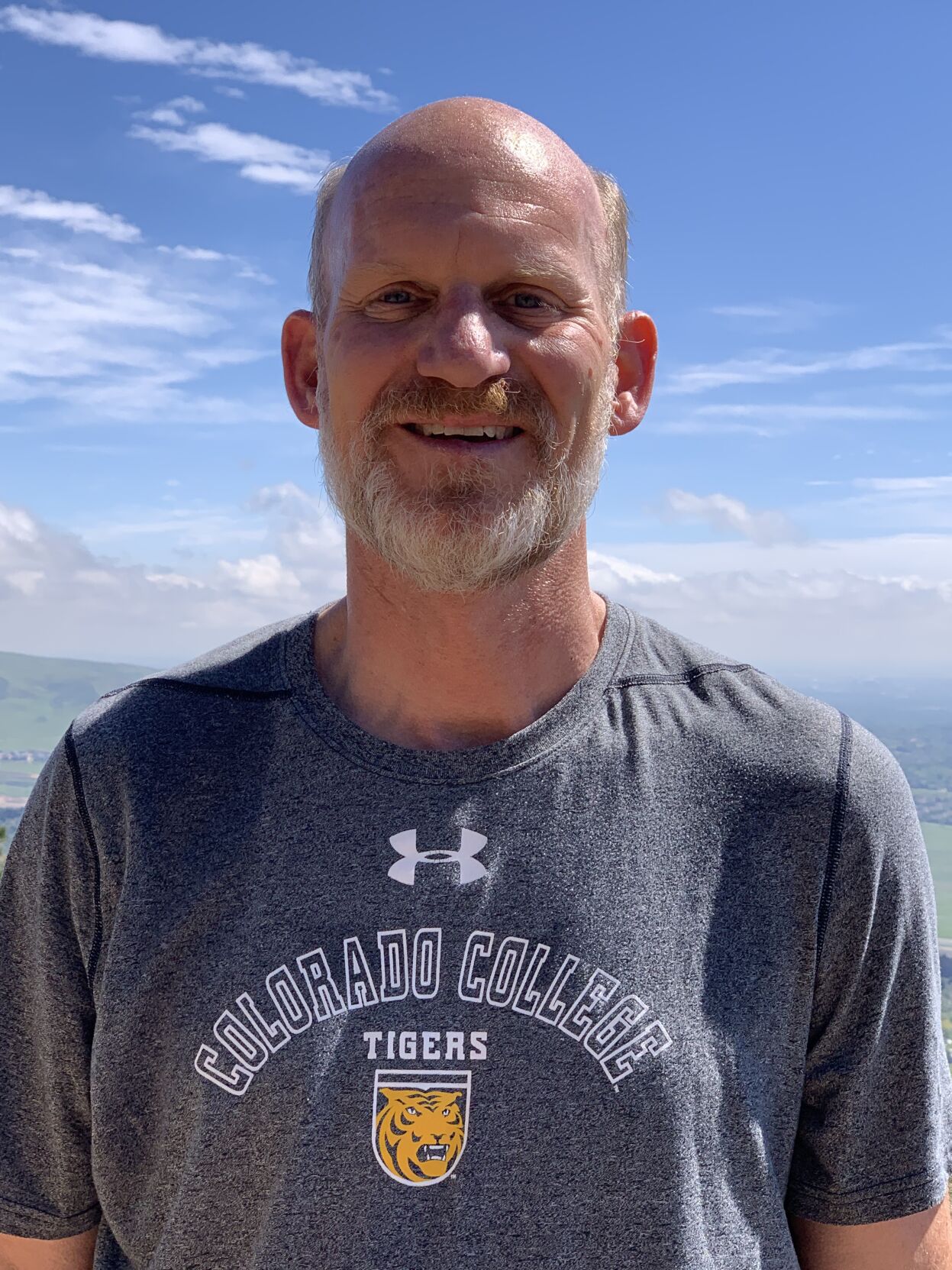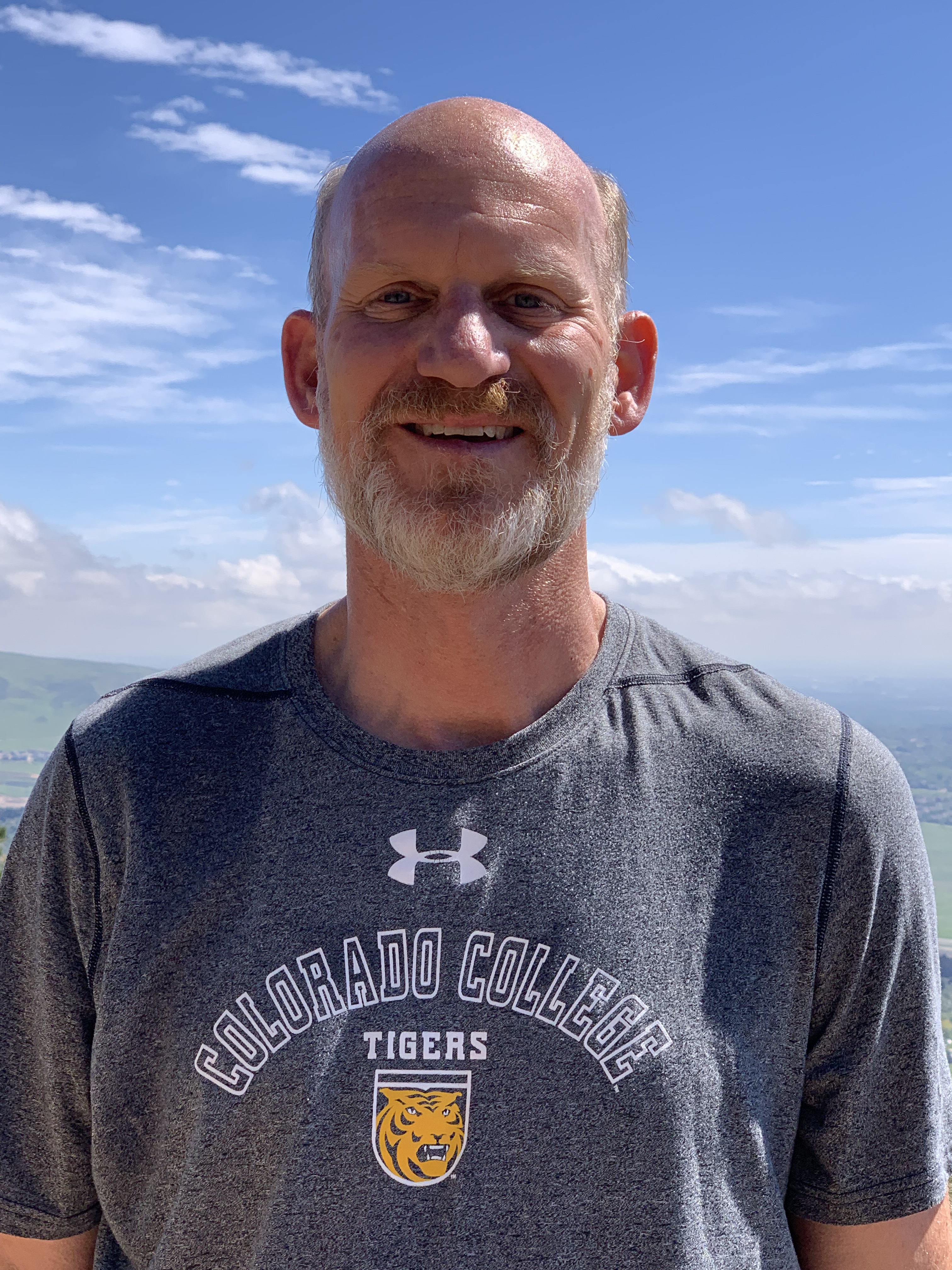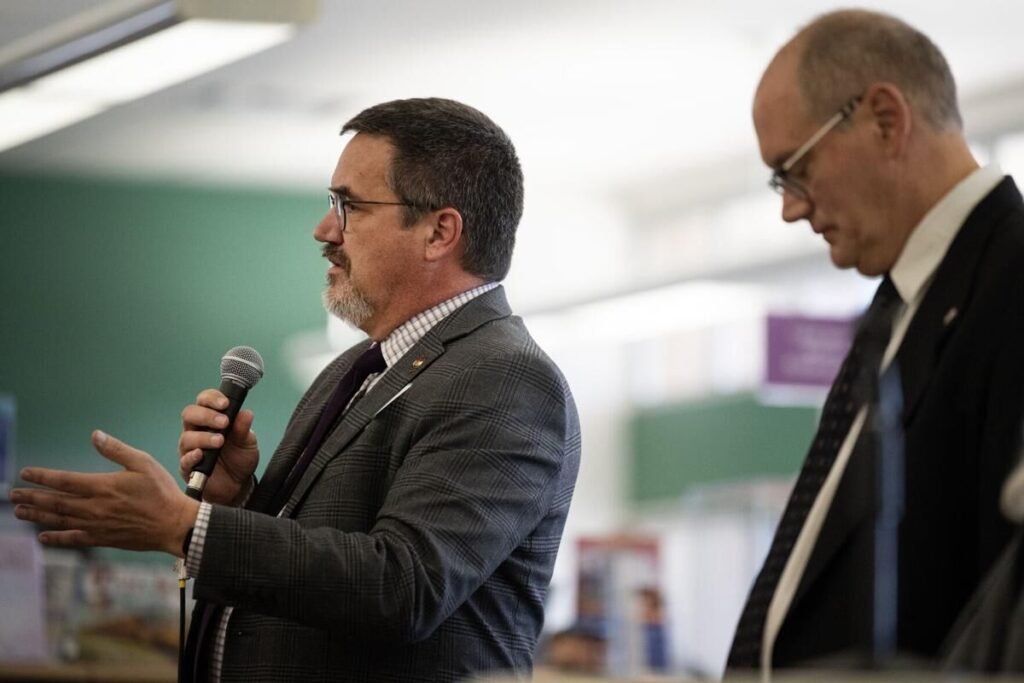Q&A with Jeffrey Colwell | ‘The bald guy’ behind Colorado’s federal court

FAST FACTS:
- Jeffrey P. Colwell has been the clerk of the U.S. District Court in Colorado since late 2012.
- He spent a quarter century in the U.S. Marine Corps, where he defended Guantanamo Bay detainees facing terrorism charges, and retired at the rank of colonel.
- A graduate of Suffolk University Law School in Boston, Colwell supervised the 90-member office that provided legal representation to prisoners held at the American base in Cuba.
- He is a certified high school varsity basketball official for boys’ and girls’ games in the Denver region.
Colorado Politics: Your background includes time spent as a military prosecutor, military defender and military judge. Do you recall what the biggest adjustments were for you in coming out of the military justice system and working for its civilian counterpart?
Jeffrey Colwell: After wearing a uniform every day for nearly 30 years, having to decide what to wear to work each day was a big adjustment for me. On a serious note, the military justice system and its federal civilian criminal counterpart are very similar. They both involve the same U.S. Constitution; the Military Rules of Evidence adopt the Federal Rules of Evidence with some minor modifications; and where there may be gaps in the military justice system, we looked to the practices of the U.S. District Courts to fill those gaps.
While I had experience in personnel and administrative law in the military, I did not have true civil litigation experience which makes up the biggest part of our caseload here in the District of Colorado. So, getting up to speed in the civil arena was probably the biggest adjustment for me.
CP: A week ago, the Biden administration announced its nominee to fill a vacancy on the U.S. District Court. And I know there is another vacancy coming up in September. Can you walk me through what has to happen at the court as you get ready to welcome a new judge?
Colwell: When we know that we will be getting a new judge, we must identify space for the new judge and her staff, specifically a courtroom and chambers space. We assist the new judge in acquiring furnishings for her chambers, and we assist the new judge in hiring staff, normally law clerks and a judicial assistant. We also designate the cases that will be reassigned to the new judge from our current sitting judges.
The new judge receives a pro-rata share of our existing caseload that is randomly selected proportionally from each of the other judges.
CP: Could you give the readers a sense of what it is you are responsible for as clerk? Would they ever get to meet you if, say, they were called for jury service?
Colwell: I like to tell people that as the clerk of court I am responsible for anything in our court that doesn’t wear a robe, and responsible to everyone that does!
Our great staff and I manage all the operations necessary to run a court. Perhaps our biggest responsibility is to maintain the court docket – all the court records. We do this entirely electronically through our electronic case management system.
Our intake team is the face of the Clerk’s Office assisting customers at our front counter and over the phone, opening new cases, records requests, you name it. Our case administrators handle all the electronic docketing within our Court. Our courtroom deputies and court reporters help run the courtrooms. We arrange and provide interpreters in criminal cases in which a defendant does not speak or understand English.
Our jury section summons the jurors necessary to cover our petite and grand jury needs. Our attorney-services division handles attorney registrations, pro bono appointments, bills of costs, and other interactions with members of our bar.
Our finance, procurement, human resources, and IT departments handle what I consider the business end of running our court. During the COVID-19 pandemic, we have been prescreening all potential jurors before they enter the courthouse; I’m outside greeting and thanking every one of them as we do so. Pre-, and hopefully post-, COVID, I will not typically greet all our jurors, but I am up and about our courthouse quite a bit, so I do get to meet many of them. Same goes for the attorneys that practice in our courthouse.
I’m the bald guy. I’m pretty easy to spot.
CP: Like most things, the court system experienced disruptions from the pandemic. Did you talk to other clerks during the course of the last year and realize they were doing things in other parts of the country that you wish Colorado had done? And on the flip side: is there anything people from other states asked your advice about?
Colwell: There are 94 federal districts in the United States, so I have 93 other terrific district clerk of court colleagues that I can consult with. We routinely bounce ideas off and pose questions to each other on an internal listserv.
Here in the 10th Circuit (Colorado, Kansas, New Mexico, Oklahoma, Utah and Wyoming), shortly after the pandemic broke, my colleague in Oklahoma City suggested we all meet regularly. We have been doing so every two weeks and it has been fabulous. These virtual meetings provide us the opportunity to share what we are each doing in our respective courts in confronting the pandemic and have allowed me to sort of calibrate where we stand.
Our court’s COVID response has not been flawless; we have made mistakes, learned valuable lessons and adjusted our course along the way. Nevertheless, nothing specific stands out to me that I wish we had done in Colorado, but many of the things we have done in Colorado we stole or adopted from other districts that were doing it first.
We were not the first district to resume jury trials during COVID, but we did so before many others. I have received many inquiries about the procedures we are using to do so.
CP: In many ways, we see people resuming their normal lives out of the expectation that the pandemic won’t last too much longer. Are there any long-lasting effects of the past year that courts will be encountering – problems that will last beyond everyone getting vaccinated?
Colwell: I think that things like wearing masks, distancing and limiting capacities are probably with us for a while. While COVID has limited, and even at times stalled, our ability to conduct jury trials, we have been able to resume conducting two jury trials per week since March, which is beginning to assist us in reducing the backlog.
I am proud to say that our court has remained open for business, albeit a good bit of it virtually, throughout the entire pandemic, and that not one case of COVID-19 has been traced back to any of our courthouses. Yes, we have had staff contract COVID-19, but they did not contract it in any of our courthouses.
CP: In Colorado’s state courts, if the public wants to watch court proceedings, they can either log on to WebEx at the trial court level or view the video feed for the appellate courts. But I believe there is no similar option for U.S. District Court. Why is that, and can we expect that to change anytime soon?
Colwell: The federal and state courts have different views and policies regarding cameras in the courtroom and the broadcasting of court proceedings. Cameras are generally prohibited in federal court proceedings and are specifically prohibited by local rule in the District of Colorado. During the COVID-19 pandemic, public access to all our court proceedings is provided via audio by calling in to a teleconference line assigned to each courtroom.
CP: You were clerk during a fairly high-profile trial: the sexual assault case of singer Taylor Swift by a Colorado DJ. Can you walk me through what preparations the court had to take for that trial that went beyond what you typically see?
Colwell: As soon we learned that this case was likely going to trial, our U.S. marshal and I recognized that this case would generate a lot of media attention, present numerous unique security concerns and that we needed to get out in front of it all. We immediately met with the presiding judge, and to his great credit, he delegated to the two of us the responsibility to develop a plan and gave us great latitude and discretion to do so.
I handled the media piece and our marshal handled the security piece. I immediately reached out to other courts that I knew had recently handled a high-profile case. This included the District of Massachusetts with the Boston Marathon bombing case, the District of South Carolina with the church shooting in Charleston, and our state court counterparts here in Colorado who had recently concluded the Aurora theater shooting case.
Robert McCallum, the public information officer for the Colorado judiciary, was a godsend to me. He relayed all the lessons learned from the Aurora theater case and connected me with all his local media contacts. Our Denver-based Associated Press office’s support was phenomenal. I essentially partnered with the AP to help advise me and run our media operations.
We turned our Jury Assembly Room into a media center where media representatives could watch the trial on closed-circuit video, plug in, and produce their stories on site. We set up a media pen out front for media broadcasts and end of day press conferences. At one point I believe we had nearly 150 media representatives on site representing local, national, foreign and entertainment-based news agencies.
With limited courtroom seating, we created a ticketing system and handed out tickets to spectators for the morning and afternoon court sessions. Parties for both sides were provided special entry procedures to avoid congestion at our main entrances. We were provided great support from our General Services Administration partners, our landlord, to provide signage and barricades for our media pen. Both the Federal Protective Service and Denver Police Department provided support outside our courthouse.
CP: Given that we have another high-profile trial on the horizon in Colorado – of the murder suspect in the Boulder massacre – what are the steps courts should take in your experience to balance access and the flow of information with the need to ensure a fair trial?
Colwell: In my last assignment in the military, I oversaw the office responsible for defending detainees at Guantanamo Bay, including the five 9/11 defendants detained there in Cuba. In that capacity, I had a lot of interaction with media and gained a true appreciation for the role the media plays pursuant to the First Amendment of our Constitution.
I think many are skeptical and even a bit fearful of the media – the media is going to get it wrong, they are going to misquote me, they are going to twist my words, they have a specific agenda. Some may, but not the true professionals. In my experience, the media professionals that I have worked with really do want to get it right, and I think that we in the courts can better partner with the media to help ensure that they do.
But, within our courtrooms, justice and a fair trial must always be paramount. I think the simple answer to your question about balancing media access and ensuring a fair trial boils down to a mutual respect and appreciation of our respective roles under the Constitution of the United States. We should both make a greater effort to develop that mutual respect and appreciation.
CP: Our younger readers will want to know: Did you get to meet Taylor Swift?
Colwell: While I had several opportunities to do so, I did not meet Ms. Swift personally. She was in our courthouse because of a legal proceeding, not for me to get her autograph. I did get to work with some of her personal staff and her personal security detail, which I must admit was kind of cool.
One of our court employees, however, took the day off and brought her daughter in to watch some of the trial. During a break in the case, her daughter got to meet and speak with Taylor briefly. It made her day.














